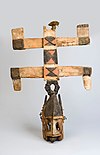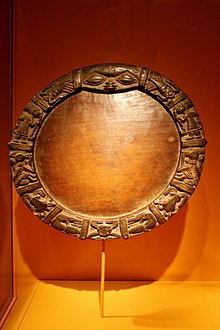
A | B | C | D | E | F | G | H | CH | I | J | K | L | M | N | O | P | Q | R | S | T | U | V | W | X | Y | Z | 0 | 1 | 2 | 3 | 4 | 5 | 6 | 7 | 8 | 9
This article needs additional citations for verification. (September 2021) |

| Part of a series on |
| Yoruba religion |
|---|
 |
| Deities |
| Beliefs |
| Practices |
| Variants |
|
| Sacred sites |
| Legendary figures |
| Part of a series on |
| Traditional African religions |
|---|
 |
The Yoruba religion (Yoruba: Ìṣẹ̀ṣe), West African Orisa (Òrìṣà), or Isese (Ìṣẹ̀ṣe), comprises the traditional religious and spiritual concepts and practice of the Yoruba people. Its homeland is in present-day Southwestern Nigeria, which comprises the majority of Oyo, Ogun, Osun, Ondo, Ekiti, Kwara and Lagos States, as well as parts of Kogi state and the adjoining parts of Benin and Togo, commonly known as Yorubaland (Yoruba: Ilẹ̀ Káàárọ̀-Oòjíire).
It shares some parallels with the Vodun practiced by the neighboring Fon and Ewe peoples to the west and with the religion of the Edo people to the east. Yoruba religion is the basis for a number of religions in the New World, notably Santería, Umbanda, Trinidad Orisha, and Candomblé.[1] Yoruba religious beliefs are part of Itàn (history), the total complex of songs, histories, stories, and other cultural concepts which make up the Yoruba society.[1][2][3]
Term
The Yoruba name for the Yoruba indigenous religion is Ìṣẹ̀ṣẹ, which also refers to the traditions and rituals that encompass Yorùbá culture. The term comes from a contraction of the words: Ìṣẹ̀, meaning "source/root origin" and ìṣe, meaning "practice/tradition" coming together to mean "The original tradition"/"The tradition of antiquity" as many of the practices, beliefs, traditions, and observances of the Yoruba originate from the religious worship of Olodumare and the veneration of the Orisa.
Beliefs


According to Kola Abimbola, the Yorubas have evolved a robust cosmology.[1] Nigerian Professor for Traditional African religions, Jacob K. Olupona, summarizes that central for the Yoruba religion, and which all beings possess, is known as "Ase", which is "the empowered word that must come to pass," the "life force" and "energy" that regulates all movement and activity in the universe".[4][5][6] Every thought and action of each person or being in Aiyé (the physical realm) interact with the Supreme force, all other living things, including the Earth itself, as well as with Orun (the otherworld), in which gods, spirits and ancestors exist.[2][7][8] The Yoruba religion can be described as a complex form of polytheism, with a Supreme but distant creator force, encompassing the whole universe.[9]
The anthropologist Robert Voeks described Yoruba religion as being animistic, noting that it was "firmly attached to place".[10]
Each person living on earth attempts to achieve perfection and find their destiny in Orun-Rere (the spiritual realm of those who do good and beneficial things).
One's ori-inu (spiritual consciousness in the physical realm) must grow in order to consummate union with one's "Iponri" (Ori Orun, spiritual self).[4]
Iwapẹlẹ (or well-balanced) meditative recitation and sincere veneration is sufficient to strengthen the ori-inu of most people.[2][4] Well-balanced people, it is believed, are able to make positive use of the simplest form of connection between their Ori and the omnipotent Olu-Orun: an Àwúre (petition or prayer) for divine support.
In the Yoruba belief system, Olodumare has ase over all that is. Hence, it is considered supreme.[2]
Cosmology
Olódùmarè
Olódùmarè is the most important "state of existence".[11] "They" are the owner of all heads, for during human creation, Olódùmarè gave "èmí" (the breath of life) to humankind. In this, Olódùmarè is Supreme.[11] [check quotation syntax] Perhaps one of the most important human endeavors extolled within the Yoruba literary corpus is the quest to improve one's "Ìwà" (character, behaviour). In this way the teachings transcend religious doctrine, advising as they do that a person must also improve their civic, social and intellectual spheres of being; every stanza of the sacred Ifá oracular poetry (Odu Ifa) has a portion covering the importance of "Ìwà". Central to this is the theme of righteousness, both individual and collective.[12]
Creation
Adherents of the Yoruba religion regard Olodumare as the principal force of creation.[13]
According to one of the Yoruba accounts of creation, at a certain stage in the process, the "truth" was sent to confirm the habitability of the planets that were newly formed. The earth, being one of these, was visited but considered too wet for conventional living.[14]
After a successful period of time, a number of divinities led by Obatala were sent to accomplish the task of helping earth develop its crust. On one of their visits to the realm, the arch-divinity Obatala took to the stage equipped with a mollusk that concealed some form of soil; winged beasts and some cloth like material. The contents were emptied onto what soon became a large mound on the surface of the water and soon after, the winged-beasts began to scatter this around until the point where it gradually made into a large patch of dry land; the various indentations they created eventually becoming hills and valleys.[11]
Obatala leaped onto a high-ground and named the place Ife. The land became fertile and plant life began to flourish. From handfuls of earth he began to mold figurines. Meanwhile, as this was happening on earth, Olodumare gathered the gases from the far reaches of space and sparked an explosion that shaped into a fireball. He subsequently[citation needed] sent it to Ife, where it dried much of the land and simultaneously began to bake the motionless figurines. It was at this point that Olodumare released the "breath of life" to blow across the land, and the figurines slowly came into "being" as the first people of Ife.[11]
For this reason, Ife is locally referred to as "Ife Oodaye" - "cradle of existence".[11][15]
Orisha Practice
Yoruba Religion is a blend and combination various practice of indigenous beliefs, myths and legends, proverbs, and songs, all influenced by the cultural and social contexts. Traditional Yoruba beliefs hold that all people experience Ayanmo, which is destiny or fate. As a part of this, there is an expectation that everyone will eventually achieve the state of Olodumare, which is becoming one with the divine creator who is the source of all energy in the Yoruba religion belief system. This list below emphasized on the name of various orisha religion name.
List of Yoruba Religion Practice
| Name | Religion | Religious Texts | Member Of |
|---|---|---|---|
| Agemo | Agemo Religion | Ifa Book | Yoruba Religion |
| Aganju | Aganju Religion | Ifa Book | Yoruba Religion |
| Ajaka | Ajaka Religion | Ifa Book | Yourba Religion |
| Akògún | Akogun Religion | Ifa Book | Yourba Religion |
| Ayangalu | Ayangalu Religion | Ifa Book | Yoruba Religion |
| Aje | Aje Religion | Ifa Book | Yoruba Religion |
| Aye | Aye Religion | Ifa Book | Yoruba Religion |
| Aja | Aja Religion | Ifa Book | Yoruba Religion |
| Babalu Aye | Babaluye Religion | Ifa Book | Yoruba People |
| Ela | Ela Religion | Ifa Book | Yoruba People |
| Egungun | Egungun Religion | Ifa Book | Yoruba Religion |
| Ibeji | Ibeji Religion | Ifa Book | Yoruba Religion |
| Iya Nla | Awon Iyami Religion | Ifa Book | Yoruba Religion |
| Oba | Oba Religion | Ifa Book | Yoruba Religion |
| Obatala | Obatala Religion | Ifa Book | Yoruba Religion |
| Oduduwa | Oduduwa Religion | Ifa Book | Yoruba Religion |
| Ogun | Ogun Religion | Ifa Book | Yoruba Religion |
| Oke | Oke Religion | Ifa Book | Yoruba Religion |
| Oko | Oko Religion | Ifa Book | Yoruba Religion |
| Olokun | Olokun Religion | Ifa Book | Yoruba Religion |
| Olumo | Olumo Religion | Ifa Book | Yoruba Religion |
| Orò | Orò Religion | Ifa Book | Yoruba Religion |
| Ọrunmila | Ifa Religion | Ifa Book | Yoruba Religion |
| Ori | Ori Religion | Ifa Book | Yoruba Religion |
| Osanyin | Osanyin Religion | Ifa Book | Yoruba Religion |
| Oshosi | Oshosi Religion | Ifa Book | Yoruba Religion |
| Oshun | Oshun Religion | Ifa Book | Yoruba Religion |
| Otin | Otin Religion | Ifa Book | Yoruba Religion |
| Oya | Oya Religion | Ifa Book | Yoruba Religion |
| Shango | Shango Religion | Ifa Book | Yoruba Religion |
| Shigidi | Shigidi Religion | Ifa Book | Yoruba Religion |
| Yemoja | Yemoja Religion | Ifa Book | Yoruba Religion |
| Yewa | Yewa Religion | Ifa Book | Yoruba Religion |
Orisha Pantheon
The Orisha, (Yoruba: Òrìṣà) are entities that possess the capability of reflecting some of the manifestations of Olodumare. Yoruba Orishas (commonly translated "unique/special/selected heads") are often described as intermediaries between humankind and the supernatural. The term has also been variously translated as "Deities", "Divinities" or "Gods".[16]
The Yoruba have developed a robust pantheon of divinities, each well developed in their different rites and traditions. Many of these have attained national/pan Yoruba statuses and are known all across Yoruba country, even when they are more strongly or closely associated with certain places, occupations or locations spread across Yorubaland. There are said to be 400 plus 1 of them in total; The 200 of the right (Igba Ọ̀tún), the 200 of the left (Igba Òsì) and one more.
Orisha(s) are revered for having control over specific elements of nature. They are thus also referred to as Imole. There are those of their number that are more akin to ancient heroes and/or sages than to primordial divinities.[3] These are best addressed as dema deities. Even though the term Orisha is often used to describe both classes of divine entities, it is properly reserved for the former one.[3]
